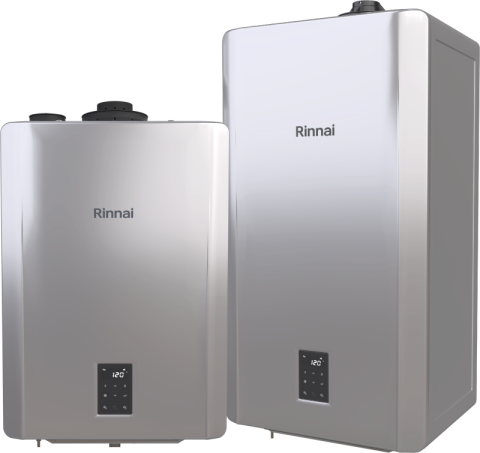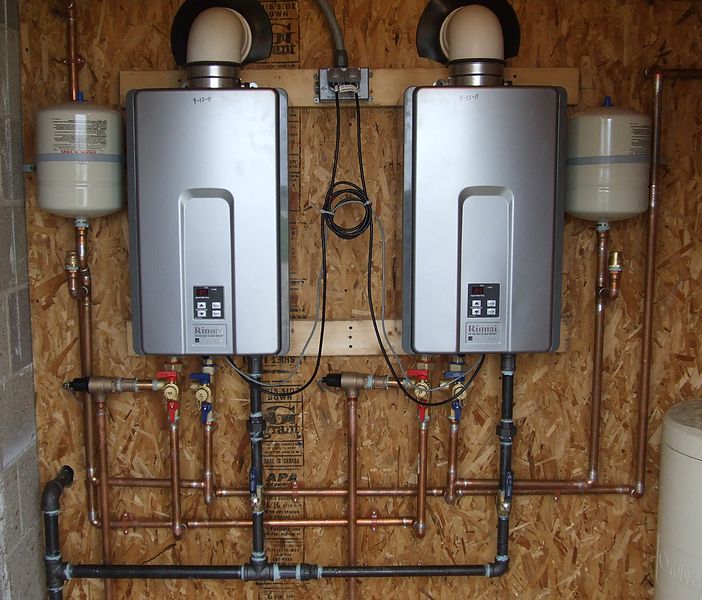Why Tankless Water Heaters Enhance Your Benefits
Why Tankless Water Heaters Enhance Your Benefits
Blog Article
Here underneath yow will discover a lot of amazing guidance relating to Why You Should Consider a Tankless Water Heater.

In a world where convenience and performance reign supreme, it's not a surprise that property owners are frequently in search of smarter methods to manage their home's power consumption and convenience. One technology that has steadily acquired appeal is the tankless hot water heater. However just what makes these systems stick out from the traditional tank-based designs a lot of us matured with? Let's dive in and explore the benefits of tankless water heaters, helping you decide if it's time to make the button in your home.
Introduction
Image this: you step into the shower after a lengthy day, expecting a soothing cascade of hot water, only to be welcomed by icy beads since the last individual used all of it up. Sound familiar? Conventional water heaters save a set amount of hot water, implying you're at the mercy of that tank's supply. Tankless systems, on the other hand, heat water on demand. No more running out mid-shower, say goodbye to fumbling with timetables simply to guarantee warm water is readily available.
Comprehending Tankless Hot Water Heater
What Are Tankless Water Heaters?
Tankless hot water heater, sometimes called on-demand or immediate hot water heater, supply warm water only as it's required. Instead of storing gallons of pre-heated water, these units kick right into activity the moment you activate the faucet. Water passes through a warm exchanger, heating up in real-time, implying you obtain an undisturbed circulation of hot water without the requirement for a large container resting idly by.
How Do They Vary from Conventional Systems?
Traditional heating units hold a tank of warm water, making use of power to keep that container at a regular temperature level. Tankless units remove the standing supply, lowering wasted energy and the cumbersome footprint of a large cylinder. Essentially, you're updating from a "stockpile" frame of mind to a "made-to-order" technique.
Usual Kinds Of Tankless Systems
Tankless water heaters generally are available in 2 ranges: gas and electrical. Gas versions often tend to supply greater flow rates, perfect for bigger families, while electrical designs commonly offer smaller sized homes and are commonly simpler to install. In addition, some systems are made for point-of-use (offering one fixture) while others can deal with the entire home's hot water demands.
Secret Advantages of Tankless Water Heaters
Energy Performance and Expense Savings
Say goodbye to warming a giant container's worth of water and maintaining it cozy throughout the day. Tankless heating units lower standby power losses, which can lower utility costs. While the initial price may be higher, the lasting savings often warrant the investment.
3. Space-Saving Style
If your home is short on storage space, removing the bulky container frees up beneficial space. Tankless devices are compact and can frequently be mounted on walls, tucked away in corners, or mounted in limited energy wardrobes without grabbing all of the whole room.
4. Longer Life expectancy
A properly maintained tankless water heater can outlast its tank-based relative. Conventional containers could last 10-15 years, while tankless versions can maintain downing along for 20 years or more, making them a strong financial investment with time.
1. Countless Warm Water Supply
Ever needed to arrange showers so everybody obtains their reasonable share of hot water? With tankless, that becomes a thing of the past. As long as the heater's circulation capability isn't surpassed, you can take back-to-back showers without becoming a popsicle.
5. Improved Water High Quality
Keeping water in a storage tank can often lead to sediment build-up or a somewhat "off" taste. With tankless systems, fresh water is heated on the spot, reducing the opportunities of debris build-up and possibly providing cleaner-tasting water.
Factors to consider Before Changing
Though the benefits are compelling, it's a good idea to think about a couple of variables prior to totally committing.
Assessing Your Home's Water Use Patterns
If your household concurrently utilizes several fixtures with high hot water need, make certain the system's flow price fulfills your needs. Recognizing your usage patterns aids you pick the ideal size and kind of tankless heating unit.
Maintenance and Care Tips
Tankless systems are reasonably low maintenance, yet they aren't set-it-and-forget-it home appliances.
Regular Cleaning and Descaling
Tough water minerals can develop in the heat exchanger, influencing performance. Routine descaling (commonly advised every year) maintains the system running at peak performance.
Annual Specialist Evaluations
A yearly checkup from a specialist ensures minor issues are captured early. They'll analyze the device's efficiency, search for leakages, and assist preserve optimum performance.
Preliminary Investment Expenses
Tankless heating systems generally come with a greater ahead of time price. Between the unit itself and prospective installation modifications, the first expense might offer you sticker shock. But bear in mind to see it as a long-term financial investment.
Setup Demands
Depending on your home's facilities, you may need added electrical ability or gas line upgrades. Ensure you comprehend the installation demands and consult with an expert to avoid surprises.
Guaranteeing Correct Ventilation
For gas designs, appropriate air flow is essential to safely get rid of exhaust gases. Make sure venting systems are clean and correctly installed to avoid any type of potential safety risks.
Comparing Different Brands and Models
Not all tankless hot water heater are produced equal.
Investigating Reputable Makers
Seek credible brand names with a history of producing top quality devices. A trusted supplier commonly offers better consumer support and longer guarantees.
Setup: DIY or Professional?
While some home owners cherish taking on jobs themselves, tankless installation may not be the best time to break out the toolbox.
Advantages and disadvantages of Do It Yourself Installation
A DIY set up can save money, however it features threats. Incorrect setup can cause inadequacy or safety issues. If you're handy and have experience, it may be practical-- however wage caution.
Checking Out Evaluations and User Feedback
Customer testimonials and comments from neighbors or friends that have actually gone tankless can provide valuable understandings. Sometimes, real-life experiences can be extra informing than advertising brochures.
When to Call a Specialist Plumber
For the majority of, calling a pro ensures whatever's done appropriately. A professional plumbing understands local codes, sizing needs, and venting criteria, decreasing the risk of incidents.
Taking full advantage of Performance
You have actually bought a tankless device-- currently maximize its efficiency.
Ideal Temperature Setups
The majority of people establish their systems between 120-140 F. Readjusting the temperature level can improve convenience and cost savings. Experiment to discover a wonderful place that doesn't lose energy.
Pairing with Low-Flow Fixtures
Intend to stretch your device's capacities? Think about installing low-flow showerheads and faucets. They lower water use, allowing your tankless system to deliver a constant stream of warm water without stressing.
Environmental Impact
Tankless hot water heater line up with greener living objectives.
Minimized Carbon Footprint
By using much less power and just home heating water as required, tankless systems can lower your home's carbon impact, reducing your environmental effect.
Conserving Natural Resources
Much less energy usage and much less squandered warm water convert right into fewer natural deposits being used, an ecological win-win.
That Profits Most from Tankless Heating systems?
The beauty of tankless heating units is that they can fit a selection of households.
Large Family Members vs. Single Owners
Huge family members could love the endless hot water supply, while single occupants value the energy savings from not heating a whole tank for simply someone's early morning shower.
Home Owners with Restricted Space
If your home is short on square footage, shedding the large tank liberates area for various other basics-- or maybe simply much more elbow room.
Eco-Conscious Customers
Going tankless aligns with environmentally friendly values, guaranteeing you're not throwing away power or sources.
Future Fads in Tankless Hot Water Heater
The world of home devices is ever-evolving, and tankless hot water heater are no exception.
Innovations in Innovation
R&D is continuously boosting heat exchangers, making systems more effective and sturdy. Future models might be even quieter, a lot more portable, and better suited for differing climates.
Smart Home Integration
Envision readjusting your water heater's temperature by means of an application or getting maintenance signals on your phone. As wise home technology developments, we'll see more connectivity and ease.
Conclusion
Selecting a tankless water heater is greater than simply upgrading your home's warm water system; it's buying long-lasting convenience, energy effectiveness, and a greener way of living. By considering your home's water usage, bearing in mind installment demands, and devoting to regular upkeep, you can delight in a stable stream of hot water without the baggage of a bulky tank. As technology evolves, you can look forward to also smarter, much more reliable tankless options that not only make your life less complicated but additionally benefit the world.
Why You Should Consider a Tankless Water Heater for Your Home
Energy Efficiency and Cost Savings
Tankless water heaters, also known as on-demand water heaters, heat water only when needed. This means they don't waste energy keeping a tank of water hot constantly. This efficiency translates into substantial cost savings on your monthly energy bills.
Endless Hot Water Supply
One of the significant advantages of tankless water heaters is their ability to provide a continuous supply of hot water. Traditional tank water heaters have a limited capacity and can run out of hot water, especially during peak usage times. In contrast, tankless water heaters can provide an endless stream of hot water, making them ideal for larger families or homes with high water usage.
Space-Saving Design
Tankless water heaters are compact and take up significantly less space compared to traditional tank heaters. They can be installed on walls, under cabinets, or even outside, freeing up valuable space in your home. This makes tankless water heaters a great option for smaller homes or properties with limited space for a traditional water heater.
Longer Lifespan and Lower Maintenance
Tankless water heaters typically have a longer lifespan compared to traditional tank heaters. They can last up to 20 years or more with proper maintenance. Additionally, tankless systems are designed with replaceable parts, which can extend their lifespan further and reduce long-term maintenance costs.
Environmentally Friendly
Reducing energy consumption not only saves you money but also benefits the environment. Tankless water heaters contribute to a smaller carbon footprint by using less energy to heat water. Their energy efficiency and ability to minimize standby heat loss make them an eco-friendly choice for environmentally conscious homeowners.
Customized Temperature Control
Tankless water heaters offer precise temperature control, allowing you to set the desired temperature to meet your specific needs. This level of customization ensures you always have water at the perfect temperature for your comfort and usage requirements.
https://beantownservices.com/blog/consider-tankless-water-heater-for-your-home

As a devoted person who reads on Pros and Cons of Tankless Water Heater, I figured sharing that chunk was worth the trouble. Do you know about anybody else who is looking into the niche? Take a moment to promote it. Thanks for taking the time to read it.
Book-Now Report this page